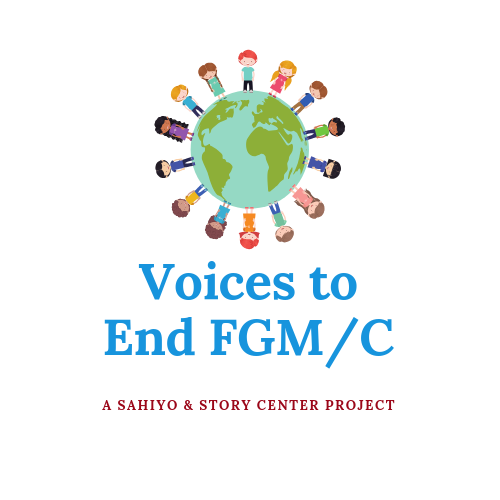Telling Stories to Address FGM/C, During a Pandemic
Amy Hill
Editor’s Note: Since 2016, StoryCenter ‘s Silence Speaks initiative has been collaborating with Sahiyo on the Voices to End FGM/C project. Here we share short reflections written by three of our newest Voices storytellers, who participated in a 2021 global online digital storytelling workshop. Voices creates space for survivors of female genital mutilation and cutting (FGM/C) and activists to talk about the impact of this form of gender-based violence on their lives. Holding a workshop during the pandemic was a way for us to build solidarity with the many communities around the world that have been put at increased risk. Sahiyo is releasing a new story from this collection each week; follow them on Facebook. They’re also offering a webinar exploring the intersections of racism and FGM/C, and how advocates can apply an intersectional approach to address the intersecting oppressions that impact different communities (July 29th, 2021).
__________________________
By Absa Samba
When I signed up to participate in the Voices to End FGM/C online digital storytelling workshop, I started thinking about what story I would tell. So many incoherent ideas came to my mind. It wasn’t until I attended the first session that I knew what story I wanted to tell. During the session, we watched sample stories that really centered my idea.
I have shared my experience as a survivor of female genital mutilation/cutting many times, but it wasn’t until this workshop that I realized that there was a part of my story that I had never shared. It was the opportunity to be surrounded by people with both an interest in ending the practice of FGM/C and lived experience of it that gave me the confidence to share this part of my story. When I speak about my experience as a survivor of FGM/C, people ask, "Why would anyone subject a person to an inhumane practice?" As an activist, I ask myself why I cannot convince some of my family members– the people I love– about its harmful effects.
The opportunity to participate in the workshop created a space for me to be vulnerable and feel supported while sharing that space with people who were doing just the same. Together, we learned, shared, supported, and healed.
By Hunter Kessous
After I first joined Sahiyo’s team as an intern, I was told to take a look at stories from the Voices to End FGM/C project on YouTube to get a glimpse of how Sahiyo uses storytelling in its approach. I was probably only expected to watch two or three videos, but I watched every single one in a single sitting. The bravery of every survivor who so beautifully shared a story was enthralling and inspiring.
Several months later, my mentor at Sahiyo suggested I join the upcoming Voices workshop as a storyteller. Advocates and allies were being welcomed into the program for the very first time. I was hesitant. What place did my story about misguided professors have, among the breathtaking, moving stories of survivors? I joined the workshop regardless, and I was open with the group about the sense of “imposter syndrome” I had. My fellow participants, activists and survivors alike, were very encouraging, and some even shared my same concern. The most important thing was that we were all united by a common goal: to raise awareness about FGM/C and hopefully end the practice. Through this shared desire, we built a supportive network, and I soon felt less like a participant in a workshop and more like a member of a community.
My biggest takeaway from joining this community was finding my voice in speaking out against FGM/C. I gained confidence in sharing my story about the issues of FGM/C education in college, because I was assured that it is a story worth sharing. It can be frightening to talk about an issue that is so taboo, and to challenge higher authorities. I didn’t know it at the time, but I needed the Voices workshop to become a better advocate for women’s rights. I’m excited to share my Voices video and continue speaking out.
By Lola Ibrahim
Storytelling is an important aspect of ending female genital mutilation/cutting (FGM/C) and offering closure for survivors, emotionally and mentally. You are able to pour out all of these random thoughts and feelings you bottled up for so long. It gives you the opportunity to begin the healing process.
I participated in the Voices to End FGM/C workshop because I knew sharing my story would help me heal and inspire people to make a change. The storytelling workshop was fun and entertaining, and the teaching was delivered in a subtle, but effective way.
I know my voice can make a difference. My pain can help others understand what FGMC survivors go through. For a long time, I didn't have the courage to face myself. Telling my story opened my vulnerability; and I realize it’s okay to be vulnerable and ask for help if you need to. The experience was therapeutic for me. I was guided throughout the whole process. I met a group of strong women who, like me, share a passion to end FGM/C. It was a journey of self-discovery.
My goal is to have women at every table where decisions that affect them are being made, and a future free from stigma, stereotypes, misogyny, patriarchal practices, and armed violence. A future that is peaceful and sustainable with equal rights and opportunities. A future free from all harmful traditional practices.
To all FGM/C survivors like me, I leave you with one of my favorite quotes:
Always remember you are braver than you believe, stronger than you seem, smarter than you think, and twice as beautiful as you’d ever imagined. - Rumi
For more information about Voices to End FGM/C, please email Mariya Taher at Sahiyo: mariya@sahiyo.com
